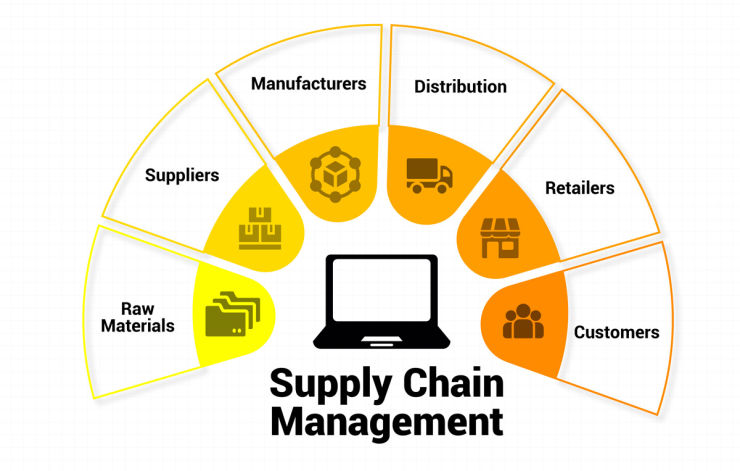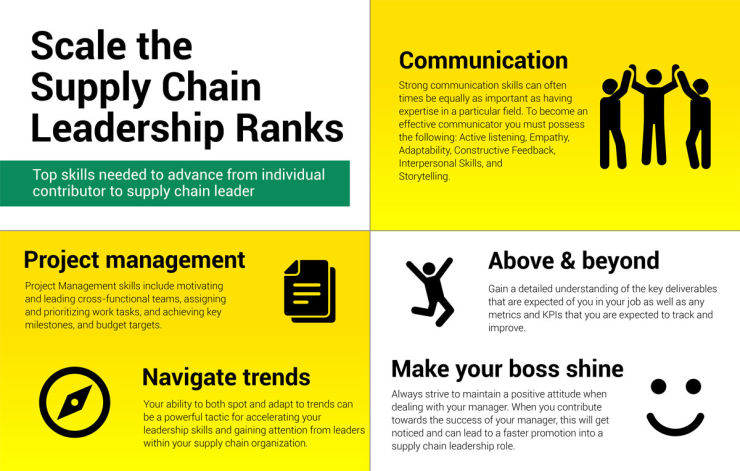
Top 8 Careers in Supply Chain Management 2024 (Inc Salaries)
Supply Chain management is so broad based and extensive that anyone choosing this career path can find something to fulfill their goals and objectives
A supply chain is a network that connects a corporation to its suppliers, upstream, and consumers, downstream. It is the sum of all of the transactions that occur for raw materials to be transformed into marketable items – from raw material sourcing to production, distribution, and delivery to the final client.
The optimization of this flow is known as supply chain management (SCM). It is focused on striking a balance between high speed (which can be expensive) and low production costs (which can be slow) to produce the most efficient processes possible.
So is a career in supply chain a good option for you? Check out Nexford University for information on a variety of courses in this field that can help fulfill your career goals, including our BBA in Supply Chain Management.
How supply chain management is changing
In a rapidly changing world, SCM is becoming a cutting-edge skill that is a vital aspect of company success. People increasingly shop online, and e-commerce companies labor around the clock to guarantee that customers receive their packages on time and in good condition. Failures in supply chain management, as is the case in the United Kingdom right now, leads to empty shelves in supermarkets and fuel stations, and consequent panic buying.
Good SCM enables businesses to obtain a competitive advantage by combining efficiency, modifying logistics, improving quality, and ensuring long-term stability by building a productive and lucrative supply chain.
Demand planning, procurement, production, inventory management and storage, transportation – or logistics – and returning surplus or defective products are all part of SCM. To function well, supply chain management requires a combination of corporate strategy, specialized tools, and teamwork.
By 2025, more than half of supply chain businesses will have a technology leadership role reporting directly to their Chief Supply Chain Officer. A supply chain business with a dedicated technology leader is in a far better position to advance digital transformation activities and build the best technology mix.

Your guide to a career in supply chain management
Like many positions in top and emerging fields, it’s important to have an ability to reflect and assess. Leaders in SCM should be able to analyze themselves and the systems they run on a regular basis and identify their areas of weakness. The learning and development process is never-ending. By being able to honestly assess their skills and work on the areas that require improvement, they gain experience at a rate that keeps up with the ever-changing supply chain environment.
Internships are especially useful for undergraduate supply chain skills. Hiring managers often want to see that entry-level candidates have participated in internships that allows them to address problems and interact with management.
If you have a graduate degree, such as an MBA, you will need to gain experience in supply chain analysis, product distribution, inventory management, and company operations. This experience enables aspiring supply chain managers to be confident in the fast-paced workflow, data-driven decision-making, and cross-departmental communication that are essential in this field.
Careers In Supply Chain Management - Top 8
1. Supply Chain Analyst
Any organization that wants to achieve operational excellence by building effective logistical procedures needs a supply chain analyst. The supply chain analyst not only studies, but also supervises all of a company’s supply chain operations. Their responsibilities involve acquiring and analyzing cost, productivity, demand, and transportation data.
They are also in charge of designing and implementing supply chain optimization projects, and partnering with IT experts and other team members to create more efficient systems. The national average income for a supply chain analyst in the United States is $68,500 per year. A senior supply chain analyst earns an average of $79,000 annually.
2. Inventory Analyst
An inventory analyst is a specialist that is in charge of monitoring inventory items and an organization’s daily inventory operations. Inventory analysts must examine inventory records and perform financial analysis to determine which products are selling well and which are not. To plan and arrange inventory pickups, they must work with project managers and shipping supervisors.
Inventory analysts also place orders with vendors and keep track of any irregularities in inventory, such as missing items. A senior inventory analyst’s annual salary ranges from $60,000 to $101,000. The demand for inventory analysts is predicted to rise by 26% between 2018 and 2028, resulting in 28,100 employment openings across the United States.
3. Logistic Analyst
To ensure a smooth supply chain, a logistic analyst can coordinate and analyze all logistic functions. They manage the full product life cycle for their company, from purchase to final resource clearance. A logistic analyst makes a substantial contribution to improving employee performance and reducing inefficiencies that would be impossible to achieve without knowledge and expertise.
The supply chain is studied and coordinated by logisticians. They are in charge of a product’s whole life cycle, which includes how it is procured, distributed, allocated, and delivered. Logistics analyst salaries in the United States range from $12,128 to $400,000, with a typical income of $58,900.
4. Supply Chain Manager
A supply chain manager monitors logistics and updates inventory as needed to keep track of a company’s supply chain. To ensure that all operations fulfill quality and safety standards, supply chain managers routinely collaborate with other stakeholders. They aim to increase the productivity and efficiency of their company and products in a cost-effective way without sacrificing material quality.
They also examine operational performance and provide solutions to problems. The national average income for a supply chain manager in the United States is $95,000 per year. The annual salary for global supply chain managers can reach $126,000.
5. Logistic Manager
In a supply chain, a logistics manager coordinates the acquisition, distribution, and coordination of products. They are the supply specialists in charge of overseeing staff and handling customer and employee concerns and complaints. They’ll also work with suppliers, customers, manufacturers, and retailers to collaborate and negotiate.
The sector is also growing as a leading employer of choice, with a solid growth rate of 10.5% each year. According to Zippia.com, 61.6% of logistics managers hold a bachelor’s degree. In the United States, the national average income for a logistics manager is $71,000 per year.
6. Purchasing Manager
Purchasing managers help wholesalers, retailers, and organizations buy resources, products, and services by planning, directing, and coordinating the process. Buyers and purchasing agents are among the procurement-related vocations they supervise. A purchasing manager is a senior-level profession that necessitates a significant amount of experience.
They must be capable of making commercial judgments and overseeing the purchasing department. In the United States, the national average income for a purchasing manager is $95,000 per year, with senior purchasing managers earning up to $109,000 per year.
7. Global Procurement Manager
A global procurement manager’s key responsibility is to develop and implement various transportation and logistics strategies in order to provide clients with the best possible service. The global procurement manager collaborates with the rest of the global team to find and deliver global leverage and supply network market expertise in order to increase value.
They conduct thorough study and analysis to assist in the company’s risk mitigation. In order to promote a high-performing global supply network, they also plan, organize, direct, and control the implementation of supply network strategies. In the United States, the national average income for a global procurement manager is $131,000 per year.
8. Global Supply Chain Manager
Global supply chain managers are in charge of a company’s foreign sourcing strategies, ensuring that high-quality materials are procured at the best possible prices. They handle logistics and inventory management, coordinating with suppliers to ensure that safety standards are met.
Their key responsibilities as a global supply chain manager will be to monitor supply chain performance and analyze data linked to this sector of business. They will also be responsible for recruiting and training employees, as well as developing feasible business plans and coordinating with other divisions of the organization. In the United States, the national average income for a global supply chain manager is $115,000 per year.
Skills needed for a successful career in the supply chain industry
To advance along your chosen career path, you must acquire the necessary abilities in that field. Some skills are unique to the area, such as the ability to use enterprise software systems such as WMS, TMS, and ERP, as well as other analytics tools. Others are soft skills that can be transferred from previous experience and will benefit you in your future undertakings.
Four of the most crucial skillsets for a successful supply chain profession are examined here.

Analytical skills
Advanced analytical abilities and knowledge of data mining approaches are required for jobs in this field.
Supply chain analytics, for example, can help a company better estimate future demand by studying client data. They assist a company in determining which products can be reduced in price when they become less profitable, as well as determining what customers’ future demands will be after the initial order.
Flexibility skills
One of the soft talents that distinguish effective supply chain leaders is flexibility. Flexibility will enable innovative thinkers to present their ideas with confidence, knowing that thinking “outside the box” produces great results.
It’s not uncommon for problems to come up during supply chain optimization projects, so plans need to be adjusted. This is the time to focus on your leadership adaptability. Accept that plans are always a work in progress, and be able to adjust your strategy as needed.
Learn how to develop the most in-demand skills for your future career!
Discover how you can acquire the most in-demand skills with our free report, and open the doors to a successful career.
Project management skills
Project management skills are the abilities and characteristics required to successfully manage a project from start to finish. If you’re aiming for a senior leadership role, knowing the fundamental concepts, difficulties, and problems of project management can help you and your managers to do a better job.
As a supply chain leader, the ability to successfully negotiate for resources, budgets, and deadlines, as well as a high level of personal organization and a proactive attitude to risk management, are the most important project management skills to acquire.
Strategic planning skills
Technological growth and innovation, including the Internet of Things and Artificial Intelligence, are all part of strategic planning and big thinking. You will come up with successful plans of action by nature as a strategic thinker, and you can always bring new perspectives to the table. Your strategic thinking abilities enable you to create detailed step-by-step designs, and come up with innovative solutions to save the firm time and money.
Strategic planning skills enable you to take into account your company’s goals and objectives. The strategic planning process also aids in the discovery of performance enhancement opportunities. It may, for example, elicit ideas about how to restructure your company so that it can achieve its maximum potential.
Better living through sustainable supply chain management
Professionals in supply chain management are becoming more and more important. Stiff competition and a push toward sustainability have necessitated inventive management. Despite the fact that many traditional manufacturing and trade roles are disappearing, supply chain managers are in high demand. A supply chain management education is the most effective foundation to launch your career in this exciting sector.
To follow a supply chain career path means possessing the soft skills and necessary qualifications, at undergraduate or graduate level. With Nexford, you can complete these courses from wherever you are, alongside your current work. Take the first steps in developing your skills for a successful supply chain management career.
Ready to get started? Download our brochure or book a call with our friendly Nexford Advisors!

Mark is a college graduate with Honours in Copywriting. He is the Content Marketing Manager at Nexford, creating engaging, thought-provoking, and action-oriented content.
Join our newsletter and be the first to receive news about our programs, events and articles.